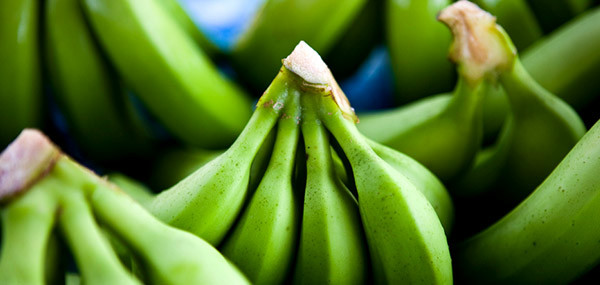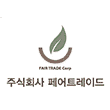- You are here :
- Home
- Farmers and Workers
- Bananas
Bananas

ABOUT BANANAS
Bananas are thought to have originated in the jungles of Malaysia, Indonesia and the Philippines in Southeast Asia where many varieties of wild banana still grow. They were spread across Asia by travellers and brought to Africa by Arabs where they were given their present name, derived from the Arabic for finger.
What goes into growing a banana?
Bananas require moist soil with good drainage and are grown in tropical regions with average temperatures of 27°C and annual rainfall of 200-250cm. Banana growing is labour intensive since the plants require individual care to produce the required quality fruit: clearing away jungle growth, propping to counter bending of the plant from the weight of the growing fruit and irrigation during the dry season.
Plantations are the predominant production model for export bananas in Latin America and increasingly in Africa and Asia. Large export plantations can be up to 5,000 hectares in size and practice monoculture, their banana trees stretching for mile after mile and, and are usually controlled or operated by national companies or large transnational corporations. They require huge investment in infrastructure and technology for transport, irrigation, drainage, cableways and packing facilities. This production model benefits from economies of scale – high volumes mean lower unit costs and lower shipping costs, and lower labor costs contribute to lower export prices.
Banana production by multinationals in some Latin American countries has been linked to a high level of human rights violations. The dire conditions and violation of core labor standards on plantations in Ecuador, Guatemala, Costa Rica and elsewhere in Latin America, have been exposed by campaign organisations like Banana Link and documented in several films. They report poverty-level wages that fail to cover basic needs of food, clothing and education; rudimentary housing; workers toiling for 10-12 hours a day up to six days a week in oppressive heat and humidity; unpaid overtime; increasing casualisation of labour and lack of job security with a prevalence of short-term contracts or daily hiring.
Small-scale or smallholder banana production is generally more labour-intensive and much less capital-intensive than on plantations. In general, small producers have difficulties gaining the economies of scale necessary to be competitive with large farms and lack access to new technologies, tools and knowledge that large farms receive via the multinational companies that buy their fruit. This means they don’t gain economically through the banana trade that is dominated by plantations and exporters, ripeners and retailers. They also battle with the growing impact of climate change that has resulted in erratic rain patterns, hurricanes and new diseases that have had a disastrous effect on the Windward Islands, for example.
What difference does Fairtrade make?
Fairtrade works with small-scale banana farmers and with workers employed on large banana plantations. There are currently 21,700 banana farmers and plantation workers participating in Fairtrade in 69 certified co-operatives and 54 certified plantations.
Fairtrade Standards are designed to improve employment conditions and protect the rights of workers on certified plantations and to support certified farmers to increase their incomes and gain more control within the banana supply chains.
Fairtrade Standards for bananas act as a safety net against the unpredictable market, aiming to ensure growers are paid a price that covers their average costs of production. The Fairtrade Minimum Price for bananas is set by region to reflect the varying costs of sustainable production. Producer organisations supplying Fairtrade markets also receive a Fairtrade Premium payment of US $1/box (or US $55/tonne) which is earmarked for business and community investment.
Fairtrade has specific standards for plantations that support worker organisation and representation, enabling them to negotiate with management and progress towards living wage benchmarks . Workers need strong organisations to represent them in these negotiations. Our new Hired Labour Standard greatly strengthens workers’ Freedom of Association in practice including the right to be part of registered trade unions. We also changed the rules for usage of the Fairtrade Premium, so workers can now spend up to 20% of the Premium on cash payments or in-kind benefits, or up to 50% if the majority are migrant workers. Fairtrade Premium continues to support much-needed social investment projects for worker communities such as building schools to support children’s education and in 2013-14 workers invested 34% of their Premium in improving worker housing.
A recent study conducted by CODER (the Corporation for Rural Business Development, Colombia) with Fairtrade certified smallholder banana farmers in Colombia concluded that ‘Fairtrade has increased smallholder income and its stability, has lowered production and agricultural-service costs, and has improved the access to credit, thus reducing their cash flow or liquidity problems.’ According to the survey, that covered nearly 80% of all certified banana farmers in the country, farmers said that their affiliation to Fairtrade had increased their household income by an average 34%. 98% of farmers also said that their quality of life had improved since joining Fairtrade.
The study also researched the difference Fairtrade makes to workers on certified banana plantations - 52% of workers interviewed said that their housing had improved with the help of Fairtrade Premiums and all workers on Fairtrade plantations studied had employment contracts, in contrast with just 16% noted on non-Fairtrade plantations.
There is a Fairtrade Banana supplier in Korea. Click here to see the profile.
Source Fairtrade bananas or other fresh fruits directly from Fairtrade producers. Click here to learn more
































































